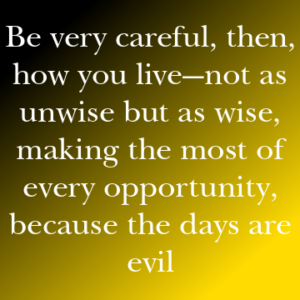 “Be very careful, then, how you live—not as unwise but as wise, making the most of every opportunity, because the days are evil. Therefore do not be foolish, but understand what the Lord’s will is ” (Ephesians 5:15-17 NIV). I’m in a quandary—a state of uncertainty or distress involving a difficult situation. I am not sure what I should do. I don’t like being in a quandary; I would much rather be in the state of Contentment. The weather there is always mild and sunny; it rains only at night. Everyone agrees with everyone else and treats one another with respect. There is no name calling or threats; all the citizens know exactly what they should do, and nobody gets offended. Of course, you won’t be able to find the state of Contentment using a map or your GPS because wherever there are human beings, there is conflict. Not that conflict is always a bad thing many good changes in society have occurred because people have objected to something they noticed or experienced for themselves—voting rights, laws benefiting the handicapped, and many more. But the road to change caused by conflict may be bumpy and uncomfortable.
“Be very careful, then, how you live—not as unwise but as wise, making the most of every opportunity, because the days are evil. Therefore do not be foolish, but understand what the Lord’s will is ” (Ephesians 5:15-17 NIV). I’m in a quandary—a state of uncertainty or distress involving a difficult situation. I am not sure what I should do. I don’t like being in a quandary; I would much rather be in the state of Contentment. The weather there is always mild and sunny; it rains only at night. Everyone agrees with everyone else and treats one another with respect. There is no name calling or threats; all the citizens know exactly what they should do, and nobody gets offended. Of course, you won’t be able to find the state of Contentment using a map or your GPS because wherever there are human beings, there is conflict. Not that conflict is always a bad thing many good changes in society have occurred because people have objected to something they noticed or experienced for themselves—voting rights, laws benefiting the handicapped, and many more. But the road to change caused by conflict may be bumpy and uncomfortable.
As a Christian, I have never been so aware of the importance of doing what is right, but my quandary is how to manage to do what is right not just in God’s eyes but also in the public eye. I am also painfully aware of how impossible it is to resolve problems with the public, especially when viewpoints on issues are so polarized. There will always be some who will not be
satisfied with the resolution of an issue.
The apostle Paul dealt with conflict all his adult life, especially after his conversion. In Ephesians he gives this instruction: “Be very careful, then, how you live—not as unwise but as wise, making the most of every opportunity, because the days are evil” (Ephesians 5:15-16). We should be cautious in how we think, speak, and behave, especially in a pluralistic culture such as ours.
Our witness to this fallen world can be easily damaged by a thoughtless remark or unkind tone of voice. In an earnest, passionate attempt to defend our values, we may push away those struggling with sin rather than seek to soothe the bruised or neglected. People who respond with bitterness and vicious anger may have suffered from real rejection of who they are, and we must meet their hostility with humility and a willingness to listen to what they feel, “making the most of every opportunity.” Wisdom, kindness, compassion, patience, self-control—those are the qualities most likely to draw others in and soften their hearts for the gospel. But we cannot do this through human effort—true wisdom and love comes from God, so we must “Be very careful, then, how [we] live,” seeking God’s will in how we approach people.
When dealing with disagreeable individuals, do we think first of them or of ourselves? It is natural to respond to hostility with anger or frustration, particularly if we are falsely accused of being bigoted or hateful. But God would have us take a different approach: “Do nothing out of selfish ambition or vain conceit. Rather, in humility value others above yourselves, not looking to your own interests but each of you to the interests of the others” (Philippians 2:3-4). Prayer is vital in reacting as the Lord wants us to treat others, regardless of their behavior. It is not natural to put the needs of others before those of our own, so we need the power of the Holy Spirit to turn our frustration into loving concern. We need to see others as Jesus sees them, sinners in need of a Savior. Most of all, we need to see ourselves the same way.
Jesus Himself placed the needs of the people of this world before His own when He allowed soldiers to arrest Him and self-
righteous men to judge Him falsely. He surrendered His power to violent men who beat Him beyond recognition and led Him to Calvary to crucify Him. He endured the most hideous execution to carry out His Father’s will, to save loathsome, ungrateful people like us. He did this for us, to show us how to treat others despite how they behave toward us: “For you were once darkness, but now you are light in the Lord. Live as children of light (for the fruit of the light consists in all goodness, righteousness, and truth) and find out what pleases the Lord” (Ephesians 5:8-10). I said that I was in a quandary, but I am not. Not really. It is not difficult to “find out what pleases the Lord” in general. I know I am to rely on the Holy Spirit to act and speak with love and compassion, not responding out of selfish concerns. I am still a bit uncertain about the details, but I can trust the Lord to nudge me when the time is right. Pray that I don’t do anything stupid: “Therefore do not be foolish, but understand what the Lord’s will is” (Eph. 5:17).
Are you in a quandary? What situation has you befuddled and confused? Rely on the Lord, soak yourself in His Word, and pray
for wisdom. Like me, you may be in this pickle because the Lord has something important to show you. The bigger the problem or the more troubling the conflict, the more important is the lesson He has to teach you. We are all students of God’s will. Be careful, pray, and move when the Spirit says to move.
I’ll be praying for you.







